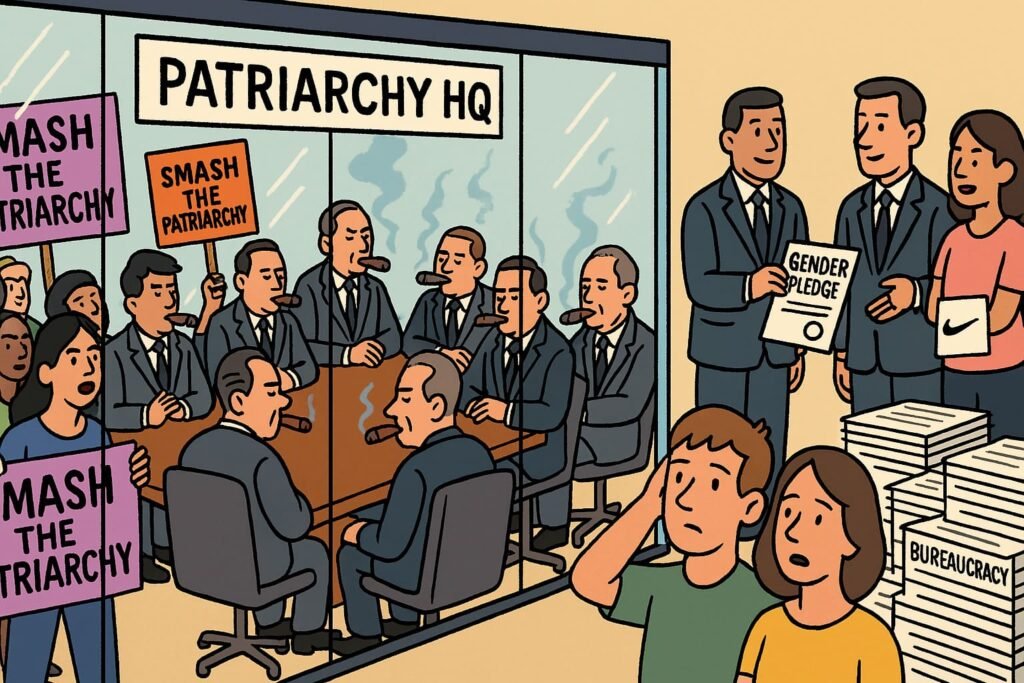Patriarchy – The System That Blames Men for Everything
From Family Structure to Universal Villain
Once, patriarchy meant a society where men held formal authority — fathers in families, kings in states, priests in churches. Today, the term has been expanded into an all-purpose villain.
In activist and academic circles, patriarchy isn’t just about men in power. It’s a system of male dominance said to underpin every institution, law, tradition, and cultural norm. From boardrooms to bedrooms, from salaries to schoolbooks — if something looks unequal, patriarchy gets the blame.
The result is less a description of history than a permanent framework of grievance.
Table of contents
What Is Patriarchy?
In modern theory, patriarchy means more than male leadership. It’s:
- Systemic: Built into laws, politics, and culture.
- Invisible: Even if men and women seem equal, patriarchy is assumed to operate in the background.
- Perpetual: Every generation accused of reinforcing it, even when reforms occur.
Patriarchy is less a fact to be proven than an assumption baked into analysis.
Buzzwords Around Patriarchy
The framework comes with its own vocabulary:
- “Toxic masculinity” – Male behaviour reframed as destructive by default.
- “Male privilege” – Advantages men supposedly enjoy, regardless of circumstances.
- “The male gaze” – Everyday culture described as shaped by male desire.
- “Smash the patriarchy” – A rallying cry that never quite defines what comes after.
Each phrase turns men from individuals into symbols of a universal system of oppression.
How Patriarchy Shows Up in Practice
- In Education: Curricula rewritten to expose “patriarchal bias” in history, literature, and even science.
- In Workplaces: Gender quotas and training sessions built around dismantling male dominance.
- In Politics: Laws framed around correcting patriarchy, from hiring targets to speech codes.
- In Culture: Films, adverts, and media critiqued through the lens of the male gaze.
What once described traditional family authority is now treated as society’s central operating system.
Why Institutions Promote the Patriarchy Narrative
- Academia thrives on analysing everything as a product of patriarchy.
- Activists gain momentum by turning every inequality into a gender battle.
- Corporations polish their brands with gender pledges and women’s leadership campaigns.
- Politicians gain credit by positioning themselves as “patriarchy-busters.”
Patriarchy isn’t just an idea — it’s an engine for careers, campaigns, and corporate virtue-signalling.
The Consequences of Patriarchy Thinking
- Division: Men cast as permanent oppressors, women as permanent victims.
- Resentment: Policies framed around guilt rather than fairness create backlash.
- Bureaucracy: New layers of gender officers, committees, and audits.
- Distraction: Real economic issues facing both sexes sidelined by identity battles.
The irony? A concept meant to empower women often entrenches hostility between genders.
Why It Matters
Patriarchy has shifted from historical reality to ideological weapon. By framing men as the root of inequality, it reduces complex social and economic issues to a single narrative of male guilt.
This shift reshapes schools, workplaces, politics, and culture — often at the expense of solidarity between men and women.
From Structure to Slogan
Patriarchy once described a social structure. Today, it’s a slogan — used to explain everything from wage gaps to bad dates.
By treating half the population as the default oppressor, the concept divides society, fuels resentment, and creates an endless cycle of accusation and reform.
What was once history has become permanent ideology.
FAQ: Patriarchy
What does patriarchy mean today?
It’s framed as a system of male dominance built into laws, culture, and institutions.
Why is it controversial?
Because it reduces complex issues to male guilt and fuels division between genders.
Where does patriarchy show up?
In education, workplace policies, politics, and cultural criticism.
Who benefits from the patriarchy narrative?
Academics, activists, corporations, and politicians who gain influence by attacking it.
What’s the risk?
It entrenches division, fuels bureaucracy, and distracts from broader economic and social issues.



